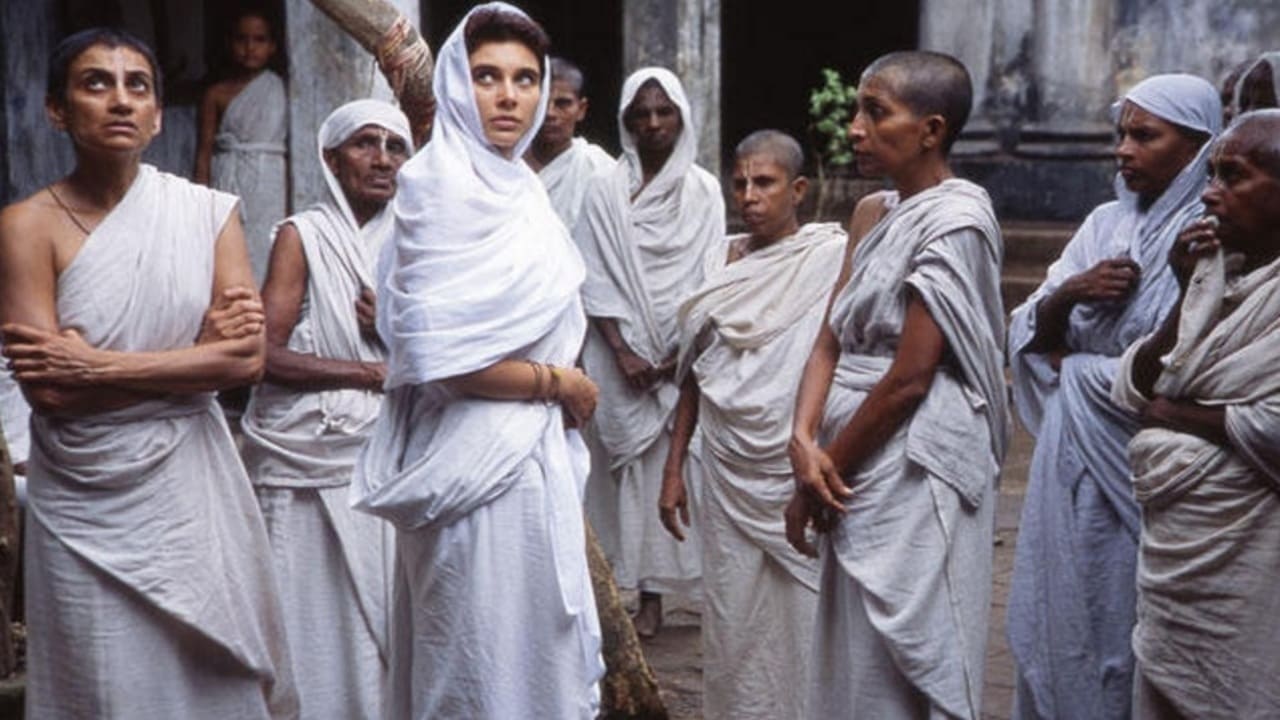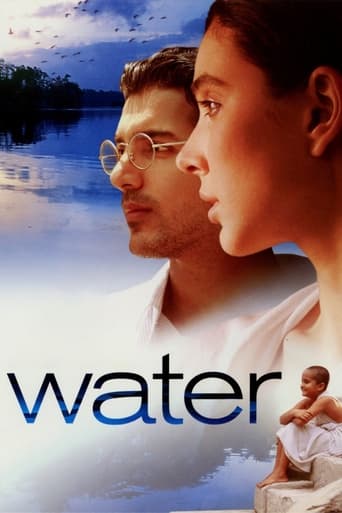

This film takes on a tragic theme-- the plight of widows in India. Unfortunately it is so riddled with clichés that, for me at least, it's impact was undermined. An eight year old girl wakes up to be told by her father that she is a widow. She is taken to an ashram to live with a group of mostly old women, also widows. Among them is a young, beautiful and rather European looking widow. There is a love story with a handsome, idealistic man, who is willing to break taboos to marry a widow. Set in 1938 the film tries to portray the conflict with old traditions and modernity. Gandhi even gets a cameo. While Water is beautifully filmed, in the end I felt that I had watched a piece of glossy propaganda, albeit for a good cause.
... View MoreWater is a movie about widows that don't really try to escape being a widow or get remarried but one woman thought it was right and she should be able to get remarried. I think this movie is trying to tell us that if you truly believe it is right, and try, it can be achieved. This is kind of like living up to your own worldview. One example of someone living up to their worldview is when one widow wanted to get married and all the other widows wanted to stop her because they believed it would curse them. She fought through them and was able to take down the peer pressure because she truly loved that man. Her whole community was against her but she still was able to go for what she believed was right. Chuyia (the little girl) also showed how she tried to fight for her worldview because when she announced that one of the widows were going to get married, one of the older widows said she couldn't. Chuyia started stepping harshly on the older widow which shows how she was standing for what she believed was right. A final example of a widow trying to what she believes is right is when Didi takes the key from the elderly widow who locked up the widow that wanted to get married. She freed the widow so she could get married, but she knew this would make many have no respect for her. Overall many people in this movie did what they truly believed was the right thing to do in their situation, and some went beyond Gods commandments, not sure if God would be okay with it but it was her worldview and she thought it was true.Arc of Movie: This movie talked about a young widow (around 7 years old) being taken to a widow house with many other widows. She meets a widow named Kalyani who meets a man and wants to marry this man. Other widows say if she marries this man she will get cursed. Kalyani commits suicide and another widow doesn't want Chuyia (the little girl) to live with the other widows in their sad life so she gave Chuyia to the handsome man that Kalyani wanted to marry, when he was on a train with Gandhi.
... View MoreI think that one of the most remarkable parts of the movie Water, directed by Deepa Mehta, is in the beginning, when a little girl named Chuyia is asked by her father if she remembers getting married, and she replies that she does not remember. She is eight years old at the time. Chuyia's husband dies, and she becomes a widow for the rest of her life. She is required to cut off her hair and she goes to live with other widows. The movie is set in 1938. Thinking about this aspect of Hindu life opens my eyes to how different the world was not so long ago. The girl, Chuyia is ripped away from her family, and is forced to live a brand new life, and she didn't choose any of it. She did not choose to be a widow or to live in this facility, and she never even got to choose to get married in the first place. Chuyia begins to make friends in the ashram. One of them is Kalyani. She is a widow just like Chuyia, except she has been forced into prostitution by the head of the ashram for financial reasons. This is why Kalyani is the only one who can keep her hair in the ashram. One day, Chuyia chases Kalyani's dog down the streets when it runs away. She runs into Narayan, who is a follower of Gandhi. Kalyani and Narayan end up falling in love. There is a glimmer of hope for the two, when a law is passed that widows are allowed to marry. The same is true for Chuyia, and she has more hope for a better future. Overall, the movie is a great depiction of how widows in India were treated. It seems so wrong that they are being treated like this, just because they no longer have a husband. In this situation, Mahatma Gandhi saved so many widows, because they were now able to live like the rest of the world's widows and remarry, or simply carry on a regular life.
... View MoreFrom the first electrifying moments when an eight year old bride is told her husband is dead and her head must be shaved and she must leave home to the boffo finish, this is a spectacularly photographed, moving drama about human potential wasted by traditions no longer viable.As with so many historical epics based on some kind of truth, every single incident cannot be accurate, and any film questioning religion of any kind is bound to have detractors--that said, there should be no question that the treatment of children and widows in this film is reprehensible.In this deeply felt film, love of all kinds also manages to flourish amid the squalor, whether the love of a outcast for her dog, or of a formally educated lawyer for a simple country girl condemned to a vow of poverty. This is a stunning film in many ways, capturing a glorious feeling of 1938 India (although it was actually filmed in Sri Lanka). It's an admirable story, well told.
... View More